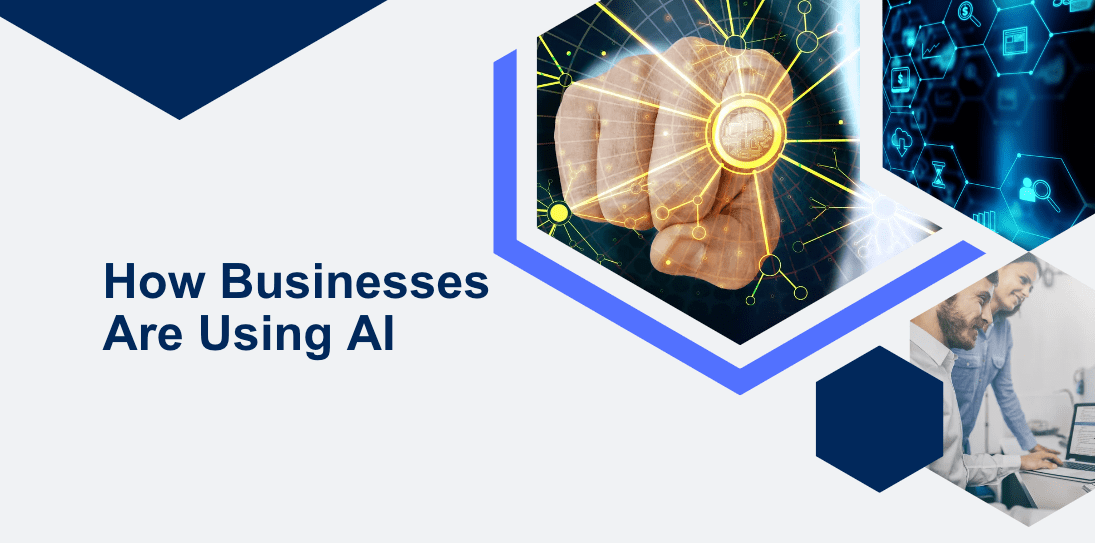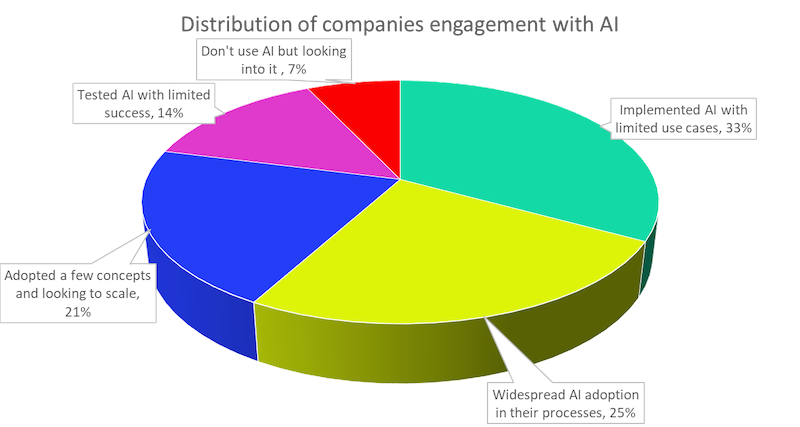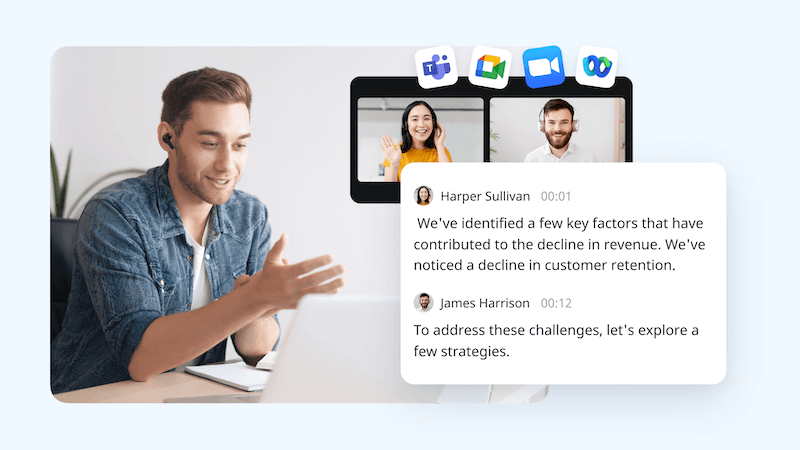
AI in Business: Benefits, Top Applications & Future [2025]
Record, transcribe and summarize conversations with one click.
With the introduction of new Artificial intelligence (AI) technology by major technology companies such as Open AI’s ChatGPT, Microsoft’s Copilot, and even more recently, Google’s announcement of generative AI updates in Workspace, AI has become the hottest topic in the business world today.
In 2023 and beyond, the potential for artificial intelligence in business will be enormous. Its ability to automate tasks, improve decision-making, and make work operations more efficient can help companies gain a competitive edge and drive growth. Therefore, business leaders must have a thorough understanding of how to leverage its potential to scale their business.
This article will explore AI use cases in business, their benefits, implementation challenges, and how your business can successfully leverage AI to its advantage. So, buckle up and get ready to discover the exciting world of AI in business.
AI and business today: True facts
AI is fast becoming a staple in the business world. Its capabilities and potential applications are almost endless, and businesses are eager to adopt it to stay competitive.
Here are some impressive facts about AI in business today:
93% of organizations have tested, used, or deployed AI or are in the process of doing so.
91.5% of leading businesses, including Amazon, Apple, and Meta, are investing money to develop AI further.
The global AI market is worth $387.45 billion and is expected to reach $1.39 trillion by 2029.
79% of sales and marketing leaders reported that AI has helped their companies increase revenue.
64% of companies that have implemented AI have experienced an increase in productivity.
Most business leaders trust AI’s ability to drive growth. 84% of C-level executives believe that adopting and leveraging artificial intelligence is necessary to drive growth, while 62% of senior executives believe it will help their companies to obtain or sustain a competitive advantage
AI is projected to contribute $15.7 trillion to the global economy by 2030.

These reports reveal the immense and undeniable impact of AI in businesses today. They also indicate that most businesses are in the process of adopting it or scaling up their usage. These developments are awe-inspiring, given AI’s rocky start with public perception. This can only mean one thing: AI is good for business.
How does AI benefit businesses?
More than ever, businesses are unleashing the power of AI in their operations and processes to bolster the efforts of their human agents and become more productive. The benefits businesses derive from AI align with the technology’s unique ability to mimic human intelligence.
Process automation
With machine learning, AI uses algorithms to identify patterns in data and make predictions based on those patterns. This process is known as intelligent automation, which allows companies to automate their workflows by streamlining the processes. This way, humans can outsource repetitive and time-consuming tasks and speed up work processes to increase efficiency.
Assigning such tasks to AI also takes the strain off employees and allows them to spend their time on more creative tasks.
Data analysis
AI analyzes and interprets large amounts of data effectively to provide businesses with the information and insights they need to understand the business better and make informed decisions.
Also, by analyzing data from sensors and other sources, AI can help businesses identify potential equipment failures before they occur, allowing them to schedule maintenance and reduce downtime.
Data security
AI tools can help manage and reduce threats to data security by detecting deviations in usual network patterns using machine learning. This way, security incidents are identified and immediately responded to.
Even better, AI becomes progressively more efficient once it has been exposed to and dealt with a risk - thus, reducing its vulnerability to similar attacks in the future.
While humans could also do an excellent job securing data, artificial intelligence is more efficient in identifying threats and dealing with multiple attacks simultaneously.
Natural language processing
Natural language processing (NLP) is an essential branch of artificial intelligence that enables machines to learn, understand, and further generate human language. It facilitates cognitive engagement between humans and computers.
This technology is being used in various applications, including chatbots, virtual assistants, and voice recognition systems.
Notta offers the most integrated AI meeting notes, summaries, and action items so nothing gets missed.
9 top applications of artificial intelligence in business
AI has shown versatility in the range of business operations it can be applied. The use cases could be simple actions like answering questions to complex ones like supply chain management.
PwC identified and rated almost 300 AI use cases in its AI Impact Index. However, for the purpose of this article, we will focus on nine top AI applications in business.
1. Customer service

Customer service tools like conversational AI, chatbots, and virtual assistants use natural language processing (NLP) to analyze customer queries and messages and generate the appropriate response. More sophisticated versions of these tools can even understand and interpret human emotions.
Businesses use this technology to:
Communicate with customers and assist. With basic training and configurations, the AI chatbot can handle multiple customer requests simultaneously, improve response times, and reduce wait times.
Predict customer needs and make tailored recommendations. AI analyzes customer data to understand their preferences and behavior, which helps make recommendations suited to their unique needs.
A major caveat with using AI in customer service is that ongoing monitoring and updating is necessary to ensure that the tools are providing accurate and helpful information for customers.
Overall, AI in customer service is powerful for improving customer experiences and engagement.
2. Marketing
AI has an expansive application in marketing involving complex operations like:
Consumer research. By analyzing data from interviews and surveys, AI will generate a report about consumer behavior and buying trends and help businesses better understand their customers’ needs.
Search engine optimization (SEO). AI helps businesses improve their search engine optimization (SEO) efforts by identifying content gaps and finding opportunities. You can ask AI to discover trend topics or high-search-volume keywords to create popular content.
Analytics and reporting. AI can help monitor the audience reach and success of your marketing efforts. You can learn more intricate details like the best email send-time and frequency and what words your audience best responds to.
3. Meeting management
AI technology can be applied to every phase of meeting management - from scheduling and attending meetings to generating notes.
Automated transcription. NLP converts speech to text in real-time, making it possible to document individual participants’ contributions and the entire meeting in textual form.
Meeting summary. By identifying the main points of the meeting, AI can create meeting summaries that give stakeholders a quick view of what happened at the meeting and the main takeaways they should be aware of.
Conversation intelligence. By analyzing the speaker’s talk time, sentiment, and other metrics, AI can generate valuable insights to guide a business’ decision-making.
Meeting management tools typically combine one or more of these functions to help businesses make the most of their meetings.
Notta, for example, has an AI Assistant that can automatically join your meetings to record and transcribe them and generate a meeting summary afterward. This way, you can stay focused on the conversation and avoid the manual work of summarizing the meetings.

4. Sales
AI is especially relevant to sales. In addition to making the process more efficient by reducing the time and effort needed to identify and engage potential customers, AI reduces costs by 40 - 60%.
AI can efficiently execute every aspect of sales management, from establishing contact with potential customers and explaining your value offering to following up and sustaining leads. It can also refer customers to human agents when faced with complex scenarios.
Other aspects of AI’s application in sales are:
Predicting consumer behavior and crafting solutions in line with their data
Managing email campaigns
Scoring and prioritizing leads based on their conversion probability
Automating sales projections
5. Human resource management
AI has become a vital tool for HR teams. Many modern teams are deploying AI tools in every part of their operations, including:
Recruitment: AI can help with recruitment and talent acquisition by filtering through CVs to select candidates who are most consistent with the company’s requirements for a role. They can also be used to maintain your talent database, schedule interviews, and source high-quality talent in the job market.
Onboarding: New recruits have to be taken through important company details such as its culture, rules, and way of work. In most companies, this is tedious and thankless work for managers or more experienced team members. This makes it a perfect task for AI. AI can be easily deployed to take recruits through these topics, while managers could step in when it’s time to answer more substantive, nuanced, or technical questions.
Training: AI can conduct adaptive assessments and develop highly personalized lessons for individual employees based on their areas of strength and where they have a knowledge deficit. This helps to streamline the training effort and therefore improves the quality of human capital.
6. Finance
AI’s application in finance ranges from engaging and onboarding clients to managing risk.
Banks and other financial institutions with a client base can use AI to attend to client complaints and queries, provide advice and recommendations, and assist them in accessing the organization’s services.
This can be extended to wealth management and creation solutions that banks and financial institutions offer. AI could be used to help clients improve their personal finances by analyzing their personal finance needs and suggesting appropriate solutions offered by the company.
AI can also be deployed in risk assessment before approving loans, regulatory compliance, fraud detection, and anti-money laundering solutions. And with online payment fraud losses expected to jump to $48 billion per year by this year, the application of AI in finance is more vital than ever.
7. Quality control and assurance
Businesses are using deep learning-enabled quality control tools to improve and accelerate their product and process inspection for less than they would pay human inspectors.
The following are some use cases of AI in quality control and assurance:
Product inspection: Using AI-powered cameras to inspect products for errors, damage, or inconsistencies, in order to prevent the release of defective products to their customers.
Process optimization: By learning key aspects of the quality control parameters and process, AI can develop its own updated rules on what would be considered a quality product.
Predictive maintenance: Here, AI detects and predicts failures in an organization’s process. This allows businesses to take preventive measures against the risk identified.
8. Supply chain management
Supply chain management consists of the different stages necessary for the timely delivery of goods and services to customers, including procurement, production, logistics, and distribution. And AI is an important factor in the efficient execution of these stages.
AI tools can be used to automate repetitive tasks, manage inventory, monitor and improve routes, and predict customer demand.
The application of supply change management has been waxing strong in recent years and supply chain organizations have been reported to expect the level of machine automation in their supply chain processes to double in the next five years.
9. Accounting
AI’s capacity to efficiently collate and analyze data and present them as intelligible information has made it a staple in many accounting teams. Businesses are using AI to automate their accounting tasks, including bookkeeping, taxes, audits, and payroll using AI.
AI facilitates processes like procurement and invoicing by automating the processing and authorization of documents necessary to set them in motion.
AI provides businesses with meaningful insight by generating reports from accounting documents processed using natural language processing and computer vision. These insights are relied on by businesses to guide their planning and decision-making.
Machine language algorithms comb through data and flag potential risks and fraud issues to prevent revenue.
AI supports regulatory compliance and auditing by monitoring documents and raising alarms where irregularities are observed.
All the application of AI in accounting eliminates the tedium of manually inputting and processing figures away from employees and allows them to channel their efforts toward areas where their judgment is necessary, such as financial strategy.
Notta AI meeting assistant records, transcribes, and summarizes meetings so everyone can stay engaged without missing important details.
Challenges of implementing AI in business
Though there are many potential benefits to implementing AI in business, there are also significant challenges that are yet to be overcome. They include:
Data privacy and security
Cost
Personnel
Public perception
Regulatory compliance
Bias potential
Data privacy and security
Data privacy and security have remained constant concerns and challenges in applying AI in business.
For one, AI often comes with the risk of IT system failures and data breaches that could lead to data corruption or leakage - both of which represent serious threats and inconvenience to businesses and their customers.
In addition to this, AI-powered technology could be more vulnerable to cyber-attacks and other security threats. Therefore, companies are responsible for taking necessary security measures to prevent these.
Cost
Even though AI is known to save costs on manual and repetitive tasks, the high cost of acquiring, setting up, deploying, and maintaining it could pose a challenge for businesses.
Businesses in their early stages, especially, might find some AI technology prohibitively expensive and inaccessible, making it harder for them to compete with more established brands.
Personnel
The lack of skilled AI personnel may prevent businesses from applying AI technology in their operations or limit the benefits they get from it.
Configuration, security settings, operation, and management of AI technology require specialists to carry out these tasks effectively.
Public perception
The exploration of AI in business has been greatly limited by its perception as villain technology because of its bad image in mainstream media. So, even though more individuals and companies are embracing AI, there is still a long way to go before it is entirely accepted.
Regulatory compliance
Businesses might run into regulatory compliance problems, especially data privacy laws, because of the personal and sensitive information AI technology requires and uses to function.
For example, AI uses bio-data information such as people’s names, ages, date of birth, nationality, gender, and sexual orientation, as well as their shopping patterns, search history, and the content they engage with to predict their wants and help companies identify potential customers. The processing, storage, and use of this information could contravene laws.
So, businesses must ensure that their AI technology and usage of personal information are in line with the relevant laws and guidelines in their industry and region.
Bias potential
One of the main concerns is the potential for bias in AI decision-making processes, which can reinforce discrimination.
A stark example of this is in talent acquisition and recruitment processes, where AI has been known to show bias based on race and disability because it can’t exercise value judgment when filtering through candidates’ profiles. In effect, if a company has had some bias in its hiring in the past, AI would simply perpetuate it rather than change it.
Companies must adopt ethical and responsible AI practices to address the identified challenges, including AI training to ensure the process is transparent and unbiased.
“The three big categories [for building ethics into AI] are first, creating an ethical culture; then being transparent; and then finally taking the action of removing exclusion, whether that’s in your data sets or your algorithms.” - Kathy Baxter, ethical AI practice architect, Salesforce
The future AI trends
“In our business, we talk about emerging technologies and how they impact society. We've never seen technology move as fast as AI has to impact society and technology. This is by far the fastest-moving technology that we've ever tracked in terms of its impact and we're just getting started.” - Paul Daugherty, Chief Technology and Innovation Officer, Accenture
The future of AI in business looks very promising as companies are beginning to invest more in the research and development of AI tools, learn more about existing technology and deploy it in their operations. This means that the technology will become more efficient, and more use cases for AI in business will be discovered.
So, in 2023 and beyond, we can expect AI applications to become increasingly sophisticated and to provide businesses with more opportunities to improve their operations and drive growth.
To this end, here are some of the top AI trends that we can expect to see in the coming years:
Highly specialized AI-powered chatbots and digital assistants
Increased use of AI for predictive analytics and forecasting
Greater adoption of deep learning techniques
Increased adoption of Generative AI
More focus on Explainable AI (XAI)
Increased use of reinforcement learning
Development of hybrid AI systems
Improved digital supply chains
Discover what AI can do for your business
To stay competitive in today’s market, business leaders must audit their current way of work to ensure that their businesses are up-to-date with AI technology.
Understanding AI technology, its development trajectory, and how other businesses leverage it to work more efficiently will help you discover opportunities for its application within your business.
However, some challenges also need to be addressed to ensure AI benefits our lives.